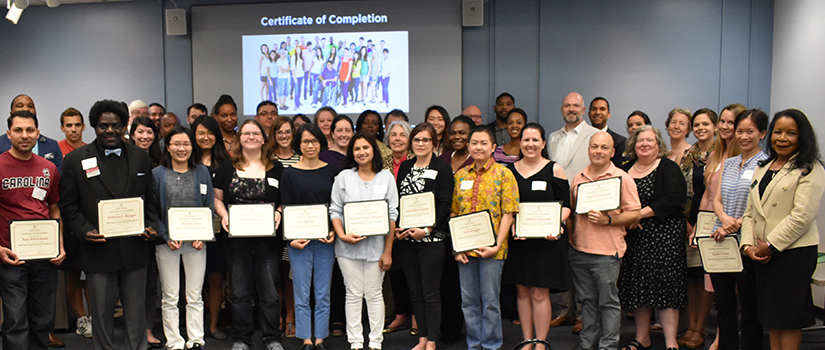How to Earn a Certificate of Completion
- Select a certificate you want to earn from this page.
- Review the required workshops.
- Register for and attend all required workshops within the time frame specified. The specified timeframes for each certificate vary from one to four academic semesters (excluding summer semester).
- Look for an email from cte@sc.edu with your digital certificate.
The Entering Mentoring certificate program is an evidence-based, interactive approach to becoming an effective mentor that will help develop the skills for engaging in productive, culturally responsive mentoring relationships, relationships that optimize success for the mentor and the mentee. Entering Mentoring accelerates the process of becoming an effective mentor by introducing a framework for mentoring, providing opportunities to experiment with different methods of mentoring, and a forum for peer-to-peer problem solving. Learn more about the Entering Mentoring Certificate.
The EXCITE Active Learning certificate of completion supports instructiors interested in strengthening student engagement through active learning. The certificate brings together a flexible set of learning opportunities that encourage educators to experiment, reflect, and apply active learning strategies in ways that fit their teaching contexts. Learn more about the EXCITE Active Learning Certificate.
The Fostering Proactive Learning Environments (FPLE) certificate program is an initiative of The Center for Teaching Excellence and the Office of Student Conduct & Academic Integrity. FPLE is designed to assist faculty, instructors and teaching graduate students to understand today’s student and how to structure your class to foster a sense of belonging, develop proactive and reactive strategies for handling academic misconduct and practice how to avoid and address classroom conflicts. Learn more about the Fostering Proactive Learning Environments (FPLE) Certificate.
The Integrative and Experiential Learning certificate (IEL) certificate is an initiative of The Center for Teaching Excellence and the Center for Integrative and Experiential Learning. The certificate program is designed to bring together faculty, instructors, and graduate students interested in exploring ways to help students reflect on and connect what they do within and beyond their curriculum, embrace multiple perspectives, and synthesize and transfer their knowledge to new, complex situations. Learn more about the Integrative and Experiential Learning (IEL) certificate.
The Mental Health and Well-Being Competency Certificate is an initiative of Counseling and Psychology Services (CAPS) and part of the Compassionate Carolina Certificate Program, designed to empower faculty and instructors to foster a culture of care and connection across the University of South Carolina. Learn more about the Mental Health and Well-being Competency Certificate.
The Teaching and Learning with Generative Artificial Intelligence certificate program will equip participants with practical knowledge and strategies needed to unlock Generative AI's full potential in education. Participants will learn how to integrate Generative AI into their teaching practices to create enriched learning environments for their students. Learn more about the Teaching and Learning with Generative Artificial Intelligence Certificate.
The Teaching Towards Inclusive Excellence (TTIE) certificate program is an initiative of The Center for Teaching Excellence and the Division of Access, Title IX, and Community Engagement. TTIE is designed to provide an opportunity for faculty, instructors and teaching graduate students to support USC’s commitment to inclusive excellence both within and outside their classroom. Learn more about the Teaching Towards Inclusive Excellence (TTIE) Certificate.
The Teaching with the Library certificate program is designed for instructors seeking to enhance their teaching through effective utilization of library resources and services. This certificate program equips participants with the knowledge and skills necessary to incorporate library collections into course curriculum, improve research learning outcomes, streamline course readings in Blackboard, and support textbook affordability through a deeper understanding of the publishing landscape. Learn more about the Teaching with the Library Certificate.
The Understanding USC Student Populations to Advance Teaching and Learning Environments certificate program is designed to elevate the specific student populations enrolled at USC to help faculty, instructors, and teaching graduate students understand the characteristics and backgrounds of the students enrolled in their classes. The sessions will utilize institutional and national data to contextualize the challenges USC students face, and each session will dedicate time to exploring associated best practices and opportunities leading to student success through activities and resource-sharing. Learn more about the Understanding USC Student Populations Certificate.
How to Check Your Progress
Participants can check their progress online by following the steps below.
- Log into Registration and Tracking System for Workshops and Events using your CTE Training Account credentials.
- Click on the specific learning plan for the certificate of completion program you would like to view. The learning plan button is located on the left-hand side in the menu screen.
- Click “View” to generate a personalized learning plan status report. The report will show the workshops you have taken, and remaining workshop requirements.
The learning plans also provide a status progress update.
- Partial means you have met some of the requirements for a specific certificate of completion program.
- Complete means you have met all the requirements for a specific certificate of completion program.
- Not Started means you have not completed any of the requirements for a specific certificate of completion program.
Completed Your Certificate?
At the conclusion of each semester, reports are run to determine who has completed each certificate. Digital Certificates will be emailed. If you do not receive your certificate by the middle of the following semester, kindly contact cte@sc.edu for assistance.
